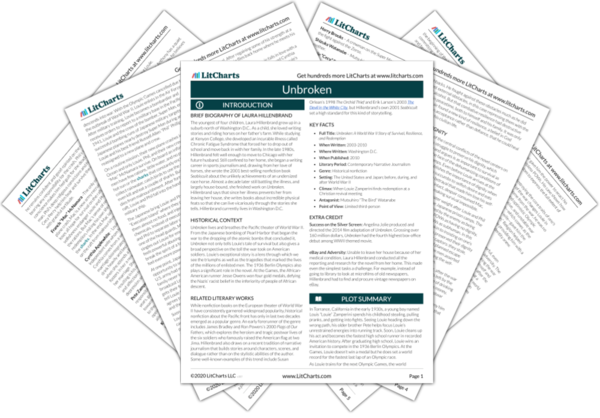Summary
Analysis
At the Omori camp, Louie encounters a handsome prison guard with large, brutish hands named Mutsuhiro Watanabe. Watanabe inspects the new arrivals at the camp, shouting that they should each state their name. When he comes to Louie, Watanabe stares at him until Louie drops his eyes. Watanabe punches him in the head and tells Louie to look at him in the eyes. When Louie raises his eyes to the man’s face, Watanabe strikes him again and says not to look at him. Tinker thinks to himself that this man is a psychopath.
The embodiment of evil and cruelty, Watanabe is the book’s sole antagonist. The monster the chapter takes its name from, he will be responsible for making Louie’s life a living hell, nearly crushing his spirit and will to survive.
Themes
Mutsuhiro Watanabe was born to a wealthy Tokyo family. He had lofty expectations for himself as a soldier, but the Japanese military rejected his application to be an officer. The humiliation of rejection left Watanabe feeling disgraced and derailed and those who knew him said that every subsequent action was informed by this humiliating dishonor. This defining event would have tragic consequences for the POWs.
In Japanese society, humiliations like Watanabe’s were identical to a complete loss of dignity that would severely undermine one’s self-worth. Without dignity or faith in himself, Watanabe will dehumanize the POWs in order to put himself above them, thereby reclaiming for himself a perverse kind of his self-worth.
Themes
At Omori, Watanabe gains a reputation as an especially cruel guard who uses psychological and emotional torture on the inmates. Kind one minute, he would suddenly become enraged, beating a prisoner for no reason. One time, he made a prisoner salute a flagpole all night. By morning, the prisoner was weeping uncontrollably. According to one Japanese guard’s wartime journal, Watanabe derived sexual pleasure from hurting the prisoners.
Here, and elsewhere, Hillenbrand asks the question, “Does war make good men evil?” Elsewhere she has answered yes. In the case of Watanabe, she answers no. Instead of dehumanizing the POWs to cope with the horrors of imprisoning them like some guards, Watanabe tortures them for torture’s sake. Hillenbrand believes that war did not give him these sadistic sexual appetites, it only gave him the power to satisfy them.
Themes
Watanabe also seeks the friendship and affection of the inmates in order to boost his vain self-confidence. When not trying to befriend the prisoners, he would try to break any of them who defied him. This desire for power made him single out Louie, a naturally defiant famous Olympian, for torture. Louie would become Watanabe’s favorite victim.
Watanabe is delusional just as much as he is cruel. As a result of his humiliation, Watanabe tries to regain his self-worth by dehumanizing and disempowering the POWs so that he can feel superior. But he also seeks that feeling of self-worth from the approval and friendship of the prisoners. Rather than finding his self-worth from a deep, inner source or from God (as Louie will later), he seeks to reclaim his lost dignity from other people – either through cruel violence or empty affection.
Themes
Get the entire Unbroken LitChart as a printable PDF.













